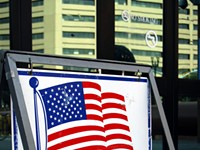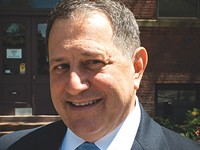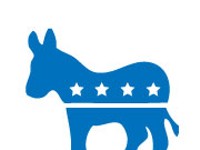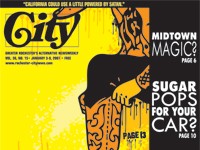The Final Four
Making the choice: a guide to the primary
[
{
"name": "500x250 Ad",
"insertPoint": "5",
"component": "15667920",
"parentWrapperClass": "",
"requiredCountToDisplay": "1"
}
]
In this web voters' guide, you'll find information about the candidates in the March 2 Democratic presidential primary. (There is no Republican primary; President Bush has no Republican challenger.) We compiled the guide by studying candidates' voting records, web sites, campaign material, media reports, and information from organizations focused on specific issues.
New York is one of 11 states holding primaries or caucuses that day; known as "Super Tuesday," it's the biggest primary day so far in this campaign season. Some tips on taking part:
Voting hours are noon to 9 p.m., and only registered Democrats can vote. (It's too late to register for this election.) If you're not sure whether you're registered or where you vote, go to the MonroeCounty website (www.monroecounty.gov), click on "Board of Elections" and then on "Am I registered" or "Your polling site." Or call the Board of Elections, 428-4550.
For our other primary coverage, see our discussion of campaign issues and our endorsements.
Although only four Democrats are running (John Edwards, John Kerry, Dennis Kucinich, and Al Sharpton), nine candidates are on the ballot. Wesley Clark, Howard Dean, Richard Gephardt, and Joseph Liberman dropped out of the race after the deadline for removing their names. Also on the ballot is perpetual candidate Lyndon LaRouche, an extremist non-Democrat.
In addition, you'll find names of numerous people who want to be delegates to the Democratic National Convention in July. The presidential candidates themselves are listed vertically on the left side of the ballot, followed by a list of delegates pledged to that candidate.
By voting for a presidential candidate, you help determine how many delegates each candidate will get. Say, for example, 100 people voted --- 75 for John Kerry and 25 for John Edwards. Kerry would get 75 percent of the five or six delegates in your congressional district and Edwards would get 25 percent.
The delegates are on the ballot so you can select the people who will represent the candidates at the Democratic National Convention. The candidates are chasing 237 delegates in New York. Nationally, the candidate who gets the backing of 2,162 delegates will win the party's nomination and be the Democratic candidate for president.
If no delegates are listed after your candidate's name on the ballot, it means nobody in your congressional district petitioned to become a delegate.
John Edwards
Worked as a trial lawyer, with a focus on personal-injury cases, before being elected to the US Senate in 1998.Serves on the Senate's Small Business, Intelligence, and Judiciary Committees and the Health, Education, Labor, and Pensions Committee. Has made US job losses and economic disparity the cornerstones of his campaign. The National Journal ranks his votes as more liberal than about 60 percent of Senators, more conservative than about 35 percent.
Economy
Has criticized NAFTA and has voted against some trade agreements that he felt did not protect US workers and the environment. Wants strict enforcement of existing trade laws.Voted against giving the president "fast-track" authority in trade negotiations, which weakens Congressional input.
Wants to give a 10 percent tax cut to companies producing goods and keeping jobs in the US and eliminate tax benefits for companies moving their headquarters offshore. Wants to establish a matching-funds and tax-credit retirement program for low and moderate-income Americans; extend unemployment benefits; strengthen workers' right to join labor unions, and raise the minimum wage by at least $1.50. Wants Economic Revitalization Zones to help regions affected by foreign trade.
Voted against the Bush tax cut and would repeal the cut for wealthiest Americans; supports providing more benefits to low and middle-income people. Would reinstate federal budget caps; reduce the number of non-defense and non-homeland-security government employees; cut federal subsidies for major oil companies and "millionaires operating farms." Would create a commission "to examine and eliminate unneeded corporate subsidies."
Low-tax and pro-business interests --- Americans for Tax Reform, the National Taxpayers Union, the American Bankers Association --- have given him low ratings. He has won high ratings from labor unions.
Environment
Voted to protect the Arctic National Wildlife Refuge; fought Bush's weakening of clean air and water standards and co-sponsored measure to reduce power-plant emissions; supports increased fuel-efficiency standards and greater use of renewable fuels; wants a moratorium on offshore drilling; wants the US to be a leader in international efforts on global warming.
The League of Conservation Voters has given his voting record moderate to high marks.
Foreign policy
Has criticized the Bush administration for its "go-it-alone," "arrogant" foreign policy and says he wants the US to work with other nations to fight terrorism, resolve conflicts, "rebuild societies based on democracy and freedom," and promote "political reform and human rights in places like Cuba, North Korea, and throughout the Middle East." Wants the US to "strengthen its commitment to the Biological Weapons Convention and the Nuclear Non-Proliferation Treaty."
On Iraq: Voted for use of military force in Iraq but at the time criticized the Bush "pre-emption doctrine" and said that the US should act with an international coalition and only if Iraq failed to adhere to UN resolutions regarding weapons inspections and disarmament. Has since said that US policy in postwar Iraq has been "confused and chaotic." Wants the UN and NATO involved in establishing a new Iraqi government and wants a NATO-led multinational peacekeeping force to insure order in Iraq. Wants "a transparent and open process" in awarding contracts in Iraq.
On Israel: Considers himself one of Israel's strongest allies in the Senate. "The Israeli people deserve to live without the fear of terrorism," he says on his website, "in a Jewish state with Jerusalem as their capital; and the Palestinian people deserve to live under a representative government that fights terrorism and corruption and supports fundamental freedoms." "This is not the time to send mixed messages about the special relationship between America and Israel," he says on his website.
Jews for Peace in Palestine and Israel, American Muslims for Israel, and the US Campaign to End the Israeli Occupation have given his voting record low ratings.
Health care
Would expand and make health care more affordable by offering tax breaks to offset insurance costs, requiring parents to cover their children, and automatically enrolling children under 21. Would establish insurance purchasing pools to lower costs for small businesses. Would allow uninsured people 55 to 65 to buy into Medicare and subsidize insurance for moderate-income workers between jobs. Would prohibit misleading drug ads, permit consumers to buy safe drugs from outside the US, and encourage hospitals' use of technology for billing and records-keeping to lower costs. Would double federal funding for health clinics.Would increase federal share of state Medicaid costs.
Abortion
Supports abortion rights and has opposed anti-choice court and administration nominees. Wants to "help lead a fight to pass a federal freedom of choice act." Opposes global gag rule and voted against banning abortions at overseas military facilities.
Planned Parenthood and NARAL (National Abortion and Reproductive Rights Action League) have given his voting record a "100," the Right to Life Committee "0."
Civil liberties, civil rights
Voted for the Patriot Act. Opposed Bush administration efforts to weaken affirmative action programs; has encouraged colleges and universities to eliminate "legacy" policies that favor children of graduates. Opposed far-right Bush court nominees such as Miguel Estrada. Supports hate-crime laws and co-sponsored law prohibiting workplace discrimination based on sexual orientation. Opposes the military's Don't Ask Don't Tell policy. Has said he supports "partnership benefits for committed gay and lesbian couples" but has been less clear on civil unions and says he opposes gay marriage.
The NAACP, Human Rights Campaign, and the National Hispanic Leadership Agenda have given his voting record high ratings. The ACLU has rated him in the 60-65 percent range. The Arab American Institute: low to moderate. The Christian Coalition and American Conservative Union: low.
Urban issues
Would give tax credits to businesses creating jobs in cities and other disadvantaged communities, expand pre-school and after-school programs, establish new tax credits for low and moderate-income people buying their first home, strengthen enforcement of the Fair Housing Act, and strengthen the Section 8 housing-voucher program
Critics say
That he's not ready for the presidency; that his knowledge, particularly on foreign policy, is thin and his proposals are vague, and that he has done little during his years in the Senate. That despite his criticism of the Iraq war, he voted for it and said he was sure that Saddam Hussein had chemical and biological weapons. That he is "a classic, corporate-friendly, centrist New Democrat" (LA Weekly), not the populist he says he is. That although he has railed against attorneys who set up tax shelters, he has done so himself. Republicans charge that his voting record is almost as liberal as Ted Kennedy's and Hillary Clinton's.
John Kerry
Was elected Massachusetts lieutenant governor in 1982 and US Senator in 1984. First caught national attention in early 1970s when, after his military service in Vietnam (for which he received three Purple Hearts), he became a strong anti-war activist and a spokesperson for Vietnam Veterans Against the War. Served as a prosecutor in Middlesex County, Massachusetts, and was an attorney in private practice. Is the ranking member on the Senate Small Business and Entrepreneurship Committee and on the subcommittees for East Asian and Pacific Affairs and for Oceans, Fisheries, and the Environment. The National Journal ranks him as more liberal than 87 of the Senate's 100 members.
Economy
Voted for the North American Free Trade Agreement; now says he wants a review of existing trade agreements, wants to strengthen their enforcement and insure that future trade agreements protect US labor and environmental standards. Wants to strengthen efforts to open export markets such as Japan.
Supports increasing the minimum wage and indexing it to inflation. Wants to strengthen manufacturing in the US by offering a jobs-creation credit, reducing the tax rate on companies that produce goods in the US, investing in new energy industries, increasing funding for research and job training, and plugging tax loopholes that encourage companies to move jobs offshore. Wants more assistance for minority and women-owned small businesses and more federal contracts and loans for small businesses.
Want to keep the middle-class tax cut but repeal tax cuts for the wealthy; wants to lower capital-gains and dividend taxes for the middle class and close loopholes that permit some corporations to avoid taxes.
Organizations promoting business interests and low taxes (Americans for Tax Reform, National Taxpayers Union, American Bankers Association, and the Chamber of Commerce) give his voting record low ratings. Labor unions have generally given him high ratings, and he has been endorsed by the AFL-CIO.
Environment
Is considered one of the Senate's strongest environmentalists. Led the fight in 2003 to protect the Arctic National Wildlife Refuge and has voted to curb global warming, protect public forests, clean up toxic waste, protect endangered species, and improve fuel economy. Wants to re-establish the US as an international leader in such areas as global warming, marine resources, and biodiversity.Proposes "a new Manhattan Project" relying on better fuel efficiency and renewable resources to make the US independent of oil from the Middle East. Wants to revitalize the Superfund to clean up contaminated sites; supports stronger protection from air and water pollution; wants federal transportation policies, housing initiatives, and funding for open space to relieve traffic congestion and fight sprawl. Opposes the logging of old-growth trees on public land.
The Sierra Club and League of Conservation Voters give his voting record high ratings.
Foreign policy
Has strongly criticized President Bush for unilateral actions that he says have alienated allies, for disregarding international institutions and international law, and for his policy of pre-emptive war. Calls for a "progressive internationalism," building alliances to fight nuclear proliferation and terrorism and foster "economic and social progress" in poor countries. Says he would "restore diplomacy as a tool of the strong" and would "treat the United Nations as a full partner." Wants a "Presidential Envoy for the Islamic World" to strengthen Islamic moderates.
On Iraq: Voted for legislation authorizing the use of force against Iraq. Has since said that Bush misled Congress and the public. Has criticized Bush for not creating a broad coalition for the war and for not having an effective post-war plan to restore order and build stability.
On Israel and Palestine: Says Israel is "our most important ally" in the Middle East and that the US must "maintain a steady policy of friendship and support for Israel." Suggests that the US and allies provide technical assistance to Palestinian security forces to help them "rein in" violent militant groups and says Israel should respond "with steps to alleviate hardships on the Palestinian people." Says Israel must "meet its obligations" regarding settlements and seems to criticize Israel's construction of the security wall "off the green line," saying it hurts Israel's long-term security and increases Palestinians' hardship.
His voting record has received low ratings from Jews for Peace in Palestine and Israel, the US Campaign to End the Israeli Occupation, American Muslims for Jerusalem, and Peace Action.
Health care
Would continue the nation's private, insurance-based health-care system but would strengthen Medicare and make insurance affordable for those not covered by Medicare. Wants to add a prescription drug benefit to Medicare and reduce the cost of prescription drugs through such measures as bulk purchases. Wants to reduce health-care costs due to waste, fraud, and high administrative costs. Wants to let businesses and individuals buy into the federal health plan, which offers greater coverage at lower cost than private plans. Wants the federal government to help states expand coverage of the poor and make health care more affordable by offering incentives for small businesses to provide health-care coverage for all employees.Wants more investment in drug-treatment programs and parity in mental-health care and health-care coverage.
Abortion
Supports abortion rights and says he would appoint only pro-choice justices to the Supreme Court. Voted against banning late-term abortions.Planned Parenthood and NARAL (National Abortion and Reproductive Rights Action League) give Kerry's voting record a 100 rating, the Right to Life Committee a 0.
Civil liberties, civil rights
Voted for the Patriot Act but has since expressed concern about its effect on civil liberties and about the treatment of Muslim and Arab immigrants. Supports expansion of federal hate-crime law.
Criticizes the Bush administration's stand on affirmative action in higher education.Wants stronger enforcement of fair-housing and fair-lending laws. Supports funding for faith-based "charities or centers" providing social services.
Voted against the Defense of Marriage Act, which denies federal recognition of same-sex marriages; supports civil unions but opposes legalization of gay marriage.Opposed the Clinton administration's "Don't Ask Don't Tell" policy for the military.
The NAACP, National Hispanic Leadership Agenda, and Human Rights Campaign have given his voting record high ratings; the ACLU and the Arab American Institute moderately high, and the Christian Coalition and American Conservative Union low.
Urban policy
Wants more federal funds for education, particularly for urban and rural schools and for after-school programs. Wants to expand Head Start and dramatically increase federal funding for low-income housing.
Critics say
That he has waffled or not taken a clear stand on trade and on the US role in the world --- especially on Iraq, supporting the Bush use-of-force plan and insisting that Saddam was a threat but criticizing President Bush now. That he criticizes Bush for taking donations from big corporations and lobbyists but is a big recipient himself --- taking donations from telecommunications interests and the securities industry, for example, and then voting for measures they support.
Dennis Kucinich
Was elected mayor of Cleveland in 1977 when he was 31; the next year, he became embroiled with Cleveland's banks when they insisted that the city, facing a large budget deficit, sell its municipally-owned utility company. When he refused, the banks forced the city into default, and he was defeated in the 1979 mayoral race. But his stand on preserving muni power was later viewed by many people as correct and courageous. He served on the Cleveland City Council from 1970 to 1975 and again from 1984-85; was elected to the Ohio Senate in 1994 and to Congress in 1996. He chairs the Congressional Progressive Caucus. The National Journal has ranked him as among the most liberal members of the House.
Economy
Wants the US to withdraw from NAFTA and the World Trade Organization.Wants a public works program, similar to Franklin Roosevelt's WPA, to increase employment.Wants to raise the minimum wage to at least $8.50 an hour.Would eliminate the Bush tax cuts that benefited the wealthy and close corporate tax loopholes.Wants universal free preschool and free college tuition at state colleges and universities.
Unions such as AFSME, the United Auto Workers, and SEIU give his voting record very high marks, often 100 percent. Business groups and groups pushing for low taxes --- Americans for Tax Reform, the National Taxpayers Union, the Chamber of Commerce, and the American Bankers Association --- give him low ratings.
Environment
Would strengthen environmental laws, increase penalties for polluters, and encourage development of renewable energy (wants 20 percent of US energy to come from renewable sources by 2010). Has received high ratings from the Public Interest Research Group, the Sierra Club, and the League of Conservation Voters.
Health care
Is the sole candidate calling for true universal health care. He wants a "single-payer," non-profit, national health-insurance plan that would cover everyone (paid for by the government, not patients and their insurance plans). Money would come from current government health-care funds and from a tax on employers that he says would cost them less than they pay now for employees' health-care coverage.
Opposes the Bush Medicare bill because it does not address rising drug prices, reduces prescription-drug coverage for many seniors, and prohibits importing drugs from Canada.
Abortion rights
In the past, has been consistently anti-choice. Voted to prohibit the use of federal funds for most abortions and to make it a criminal act to take a teenager across state lines for an abortion without parents' consent. Voted against requiring federal employees' health-care plans to cover prescription contraceptives. Voted for the "global gag rule" barring funds for foreign non-governmental organizations that perform abortions or provide abortion counseling or referrals.
In 2003, however, his stance changed, and he voted in favor of lifting the ban on military personnel obtaining abortions from military hospitals overseas, and against the bill to criminalize late-term abortions. He says he has "had a journey on this issue" and that he now "wholeheartedly supports a woman's right to choose" and "will only support someone for the Supreme Court if he or she agrees to uphold Roe v. Wade."
In the past, has received high ratings from the National Right to Life organization and low marks from Planned Parenthood and the National Abortion and Reproductive Rights Action League. Planned Parenthood currently gives his voting record a "mixed" rating.
Foreign policy
Wants the US to "re-establish the United States as a cooperative partner with the world in matters of world peace."Proposes a Department of Peace to search for non-violent solutions to international problems.
Would approve the Kyoto Treaty on Global Climate Change, the Landmine Treaty, the Nuclear Non-Proliferation Treaty, and the Anti-Ballistic Missile Treaty.Wants the School of the Americas --- whose record includes training brutal military personnel from Central America --- shut down.
On Iraq: Has consistently opposed the US war and occupation. Wants the UN to take over peacekeeping operations, management of Iraq's oil industry, and awarding of all contracts for rebuilding the country. In 1998, however, he voted in favor of the Iraq Liberation Act, which spelled out Saddam Hussein's record and called for regime change. In 2000 he opposed sanctions against Iraq but later endorsed them as an alternative to war.
On Israel and Palestine: Voted "present" on a House resolution expressing "solidarity with Israel." Wants an "even-handed approach," supporting both the State of Israel and a Palestinian state, supporting the security of both Israelis and Palestinians.Wants "global financial aid to the Palestinian people as they move toward Statehood."Wants the US to "ask Israel to stop building walls... to tear down the walls... to not participate in the building of any new settlements."
Jews for Peace in Palestine and Israel give his voting record relatively high marks; American Muslims for Jerusalem and the Campaign to End the Israeli Occupation, high marks.
Civil liberties, civil rights
Is the only candidate who voted against the Patriot Act and wants it revoked.Supports both civil unions and marriage for gays and lesbians. Opposes the death penalty for federal crimes and supports legalization of marijuana. On the other hand, he has voted in favor of a constitutional amendment banning flag-burning. and in favor of impeaching President Clinton.
The American Civil Liberties Union, Americans for Separation of Church and State have given his voting record generally high ratings. The NAACP, Human Rights Campaign, Arab American Institute, and National Hispanic Leadership Agenda have given him high ratings. The Christian Coalition and the American Conservative Union give him extremely low marks.
Critics say
That this vegan, spiritual-friend-of-Shirley-MacLaine is a "fringe candidate," that some of his stands are extreme. That he's a perpetual candidate, running to get attention (18 races in 35 years, beginning with a run for Congress when he was 25). That he has accomplished little in his seven years in Congress. Early in his political career, he was accused of race-baiting early for some of his actions when he supported a white Republican running for mayor against African-American Carl Stokes. He opposed establishing a holiday honoring Martin Luther King.
Al Sharpton
Ordained Pentecostal minister, outspoken and often controversial activist. His record includes work with such organizations as Operation Breadbasket and, in the 1980s, serving as the high-profile advocate for Tawana Brawley, a black teenager who charged, falsely, that she had been abducted and raped by white policemen. Has supported Republicans such as Al D'Amato and George Pataki "to send a message to the Democrats."
Economy
Wants taxes used for economic development, schools, and protection of voters' rights "before we ship our dollars overseas to places such as Iraq and Afghanistan." Wants to end the Bush tax breaks for the wealthiest citizens and increase tax breaks for low and middle-income people.
Foreign policy
Criticizes the Bush administration for "inflammatory and provocative language." Says the Bush administration's doctrine of pre-emption is "dangerous and traditionally un-American." Believes the US must "heal the rift that we have caused with allies in the United Nations and those that may not be allies."
On Iraq: Opposed the war in Iraq. Wants a multinational effort for peacekeeping and reconstruction.
On Israel-Palestine: Calls for "a balanced approach."
Health care
Supports a constitutional amendment guaranteeing all Americans the right to equal, high-quality health care.
Abortion
Supports abortion rights.
Civil rights, civil liberties
Citing qualified voters who were prevented from voting in the 2000 presidential election, he wants a Right to Vote amendment to the constitution to insure that all votes are counted, that the votes of members of the Electoral College reflect the popular vote in their district and state, and to provide election-day registration.
Supports gay marriage.
Other issues
Supports an amendment guaranteeing children equal, high-quality public education.Wants statehood for the District of Columbia.
Critics say
That he is a gadfly seeking publicity; that he has not only supported Republicans in election campaigns but has turned his 2004 presidential campaign over to Roger Stone, whom the Village Voice describes as "a longtime Republican dirty-tricks operative" who "led the mob that shut down the Miami-Dade County recount and helped make George W. Bush president in 2000." That his campaign has been almost entirely financed by Republicans intent on, as the LA Weekly puts it, frightening moderate Democrats.
Speaking of...
-

New York cancels presidential primary amid coronavirus concerns
Apr 28, 2020 -

For Louise Slaughter's seat: Joe Morelle
Jun 12, 2018 -

Debate gave closer look at personalities
Sep 8, 2017 - More »






